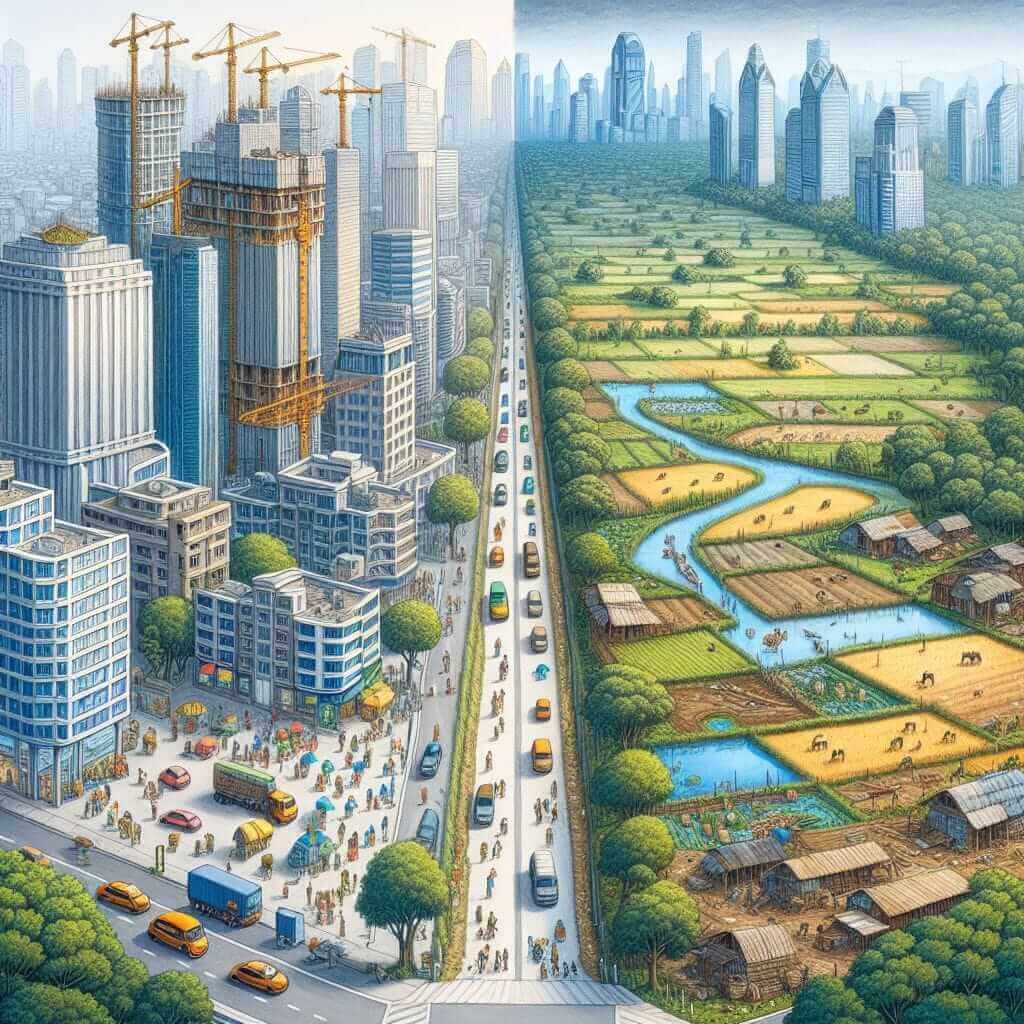Urbanization is a phenomenon that has been accelerating in recent decades, particularly in developing countries. The movement of people from rural areas to cities in search of better opportunities and amenities has had profound impacts on rural communities. This essay will explore the multifaceted effects of urbanization on rural communities, a topic that is highly relevant for IELTS Writing Task 2. Let’s delve into this subject and examine potential essay prompts you might encounter.
Common IELTS Prompts on Urbanization and Rural Communities
Urbanization often emerges in IELTS Writing Task 2 prompts due to its global relevance. Here are some example questions:
- “Urbanization has significantly changed the landscape of rural communities. Discuss the positive and negative effects of urbanization on these communities.”
- “The movement of people from rural to urban areas has advantages. Do the advantages of urbanization outweigh the disadvantages?”
- “To what extent has urbanization impacted the social and economic structures of rural communities?”
For this exercise, we will address the first prompt.

Analyzing the Prompt
Prompt Chosen: “Urbanization has significantly changed the landscape of rural communities. Discuss the positive and negative effects of urbanization on these communities.”
Key Points to Address
- Definition and Explanation: Explain what urbanization is and its relevance today.
- Positive Effects: Highlight the improvements in infrastructure, healthcare, and education in rural areas resulting from urbanization.
- Negative Effects: Discuss the loss of agricultural land, cultural erosion, and economic challenges faced by rural communities.
- Balanced Conclusion: Summarize the findings and provide a balanced view on whether the positives outweigh the negatives.
Sample Essay
Urbanization, the process of large numbers of people moving from rural areas to urban areas, profoundly influences social, economic, and environmental structures worldwide. Rural communities, in particular, have experienced noteworthy transformations due to this global trend. This essay will discuss both the advantageous and detrimental effects of urbanization on rural communities.
On the positive side, urbanization has often led to substantial improvements in infrastructure within rural communities. Governments, aiming to support growing urban populations, have extended road networks, electricity, and internet access to remote areas. This has facilitated better connectivity and access to amenities. Moreover, the urban exodus has resulted in improved healthcare facilities being available in rural regions, thus enhancing the overall quality of life. Educational opportunities have also expanded, as seen in the establishment of schools and vocational training centers. These developments play a crucial role in empowering individuals in rural areas, equipping them with the skills needed for modern occupations.
Conversely, urbanization has also brought several challenges to rural communities. One of the primary issues is the significant reduction in agricultural land. As people migrate to cities, farmland is frequently repurposed for industrial use or housing developments, leading to decreased agricultural productivity. This land transformation can jeopardize food security and economic stability in rural areas that primarily depend on agriculture. Additionally, the cultural fabric of rural communities often suffers. Traditional lifestyles and practices may be lost as younger generations adopt urban values and lifestyles, leading to cultural erosion. Economic disparities can also widen; while some might gain from selling their land, others may struggle to find viable employment or sustain their businesses in the changing landscape.
In conclusion, the effects of urbanization on rural communities are both extensive and multifaceted. While advancements in infrastructure and educational opportunities represent significant benefits, the adverse impacts on agriculture, culture, and economic equality cannot be overlooked. It is imperative for policymakers to devise strategies that harness the benefits of urbanization while mitigating its harmful effects to ensure balanced development.
Word Count: 323
Writing Tips for This Essay Type
Vocabulary and Grammar
- Use specific terminology: Words and phrases such as “urban exodus,” “repurposed,” “cultural erosion,” and “economic stability” enhance the sophistication of your argument.
- Complex sentences: Employ a mixture of compound and complex sentences to clearly articulate sophisticated ideas.
- Passive voice: Utilize the passive voice judiciously to shift focus onto actions and outcomes rather than the subjects performing them.
Key Vocabulary
- Urbanization (n) /ˌɜrbənaɪˈzeɪʃən/: The process through which cities grow, and more people begin to live in urban areas.
- Infrastructure (n) /ˈɪnfrəˌstrʌktʃər/: The basic physical systems and services needed for the operation of a society or enterprise (e.g., transportation, communication networks).
- Cultural Erosion (n): The diminishing of a community’s traditional practices and identity due to external influences.
- Repurpose (v) /riˈpɜrpəs/: Adapt (something) for use in a different purpose.
- Economic Stability (n): A state in which economic policies, institutions, and markets are predictable and facilitate growth or development.
Conclusion
Understanding the effects of urbanization on rural communities is crucial for anyone preparing for the IELTS exam. This topic not only appears frequently in writing prompts but is also pertinent in global discourse. By evaluating both positive and negative outcomes, learners can develop balanced, in-depth essays that are well-suited for high band scores in the IELTS Writing Task 2.
For further reading on related topics, you might find these articles beneficial:
- “The Impact of Urbanization on Rural Communities”
- “The Impact of Urban Sprawl on Community Cohesion”
Happy studying, and may your understanding of urbanization and its impacts lead to higher scores and deeper knowledge!